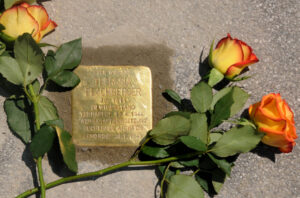Theresia (Therese) FLACHBERGER, neé ROHLIK, was born in Salzburg on November 15, 1911.
She was an unskilled worker who came from a working class family and was married to the locksmith Franz FLACHBERGER – who had also been raised in a working class milieu. They had no children.
Shortly after spending Christmas Eve 1943 with their extended family the couple was arrested by the Gestapo, and on August 29, 1944 they were sentenced by the Vienna Superior Court to two years in prison and three additional years loss of civil rights for »undermining the military.« The wife lost her life in a Bavarian prison while her husband survived his imprisonment and died in Salzburg in 1972.
The events of the fateful family Christmas Eve and their consequences can be reconstructed from prisoner file #3260 of the women’s prison in Aichach. Theresia FLACHBERGER’s hand written autobiographical statement from January 8, 1945 gives evidence of her character, her level-headedness and persistence.
She was convinced that she was the victim of a hate motivated accusation that had led to her conviction and imprisonment: »… avoiding a punishment wasn’t possible as I was denied all credibility and the accuser acted out of hate because my husband was still at home [i.e. not at the front]…«
The »accuser« who denounced them to the Gestapo was Anna WINKLER, the sister of a sister-in-law of Franz FLACHBERGER, a family intimate whose differing political convictions came out on Christmas Eve 1943.
When Franz and Theresia FLACHBERGER condemned the murderous war against the Soviet Union Anna WINKLER took it as a personal attack as the mother of a soldier who couldn’t be there for Christmas.
The judicial verdict, based on the Gestapo investigation, concluded that Anna WINKLER had understood the statements of the accused to apply to her son and amounted to calling her son a murderer. So she called the accused Franz FLACHBERGER a despicable scoundrel and a Communist.
That the FLACHBERGER couple had belonged to the Social Democratic party before it had been banned in 1934 was considered significant in the opinion of the court. In the lexicon of the Nazi terror, »Marxists« were considered to be enemies of Germany even if they hadn’t been politically active for a decade and didn’t belong to any resistance group.
At 3:45 pm on January 24, 1945 the 33 year old Theresia FLACHBERGER died from a »heart-attack« in the Bavarian Aichach prison – at least that was the official story, and no other report reached her husband, mother and siblings when they got the sad news.
But on the typed death notice in prisoner file #3260 there is a hand written note: »cause of death certainly not ‘heart attack.’ Replace with ‘bled to death’ January 26, 1945«
Sources
- Munich State Archive: Aichach Prison prisoner file #3260 including judicial opinion and autobiographical statement
- Salzburg Provincial Archive: Victim’s assistance file S-716 (Franz Flachberger)
- Widerstand und Verfolgung in Salzburg 1934 – 1945, volume 2, p. 397 (the published judicial verdict which includes the full name of the informer)
Translation: Stan Nadel
Stumbling Stone
Laid 06.07.2011 at Salzburg, Gaswerkgasse 24 / Ignaz Harrer Str. 11



